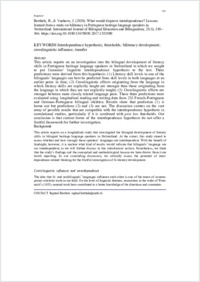What would disprove interdependence? : Lessons learned from a study on biliteracy in Portuguese heritage language speakers in Switzerland
BLE-BLL
- Berthele, Raphael ORCID Université de Fribourg
- Vanhove, Jan ORCID Université de Fribourg
- 2020
Published in:
- International Journal of Bilingual Education and Bilingualism . - 2020, vol. 23, no. 5, p. 550-566
English
This article reports on an investigation into the bilingual development of literacy skills in Portuguese heritage language speakers in Switzerland in which we sought to put Cummins' linguistic interdependence hypothesis to the test. Three predictions were derived from this hypothesis: (1) Literacy skill levels in one of the bilinguals' languages can best be predicted from skill levels in both languages at an earlier point in time; (2) Crosslinguistic effects originating from the language in which literacy skills are explicitly taught are stronger than those originating from the language in which they are not explicitly taught; (3) Crosslinguistic effects are stronger between more closely related language pairs. These three predictions were evaluated using longitudinal reading and writing data from 233 French\textendash Portuguese and German\textendash Portuguese bilingual children. Results show that prediction (1) is borne out but predictions (2) and (3) are not. The discussion centres on the vast array of possible results that are compatible with the interdependence hypothesis in correlational studies, particularly if it is combined with post hoc thresholds. Our conclusion is that current forms of the interdependence hypothesis do not offer a fruitful framework for further investigation.
- Faculty
- Faculté des lettres et des sciences humaines
- Department
- Département de plurilinguisme et didactique des langues étrangères
- Language
-
- English
- License
- License undefined
- Open access status
- green
- Identifiers
- Persistent URL
- https://folia.unifr.ch/unifr/documents/320946
Statistics
Document views: 62
File downloads:
- berthele_vanhove_2020_postprint.pdf: 368
